Security Threats in Maritime Industry and West Africa: Risks, Impacts, and Recommendations
VerifiedAdded on 2023/04/24
|12
|3176
|136
AI Summary
In this discussion we will discuss about security issues in maritime Industry & west africa and below are the summaries point:-
Introduction highlights the rising security threats in the maritime industry and West Africa.
Various types of security threats are discussed, including computer worms, spyware, cybercrimes, hacking, phishing, and spoofing.
The impact of cybersecurity on the maritime industry is explored, emphasizing its importance and potential risks.
The issue of piracy due to political instability in West Africa is addressed as a significant security concern.
Contribute Materials
Your contribution can guide someone’s learning journey. Share your
documents today.
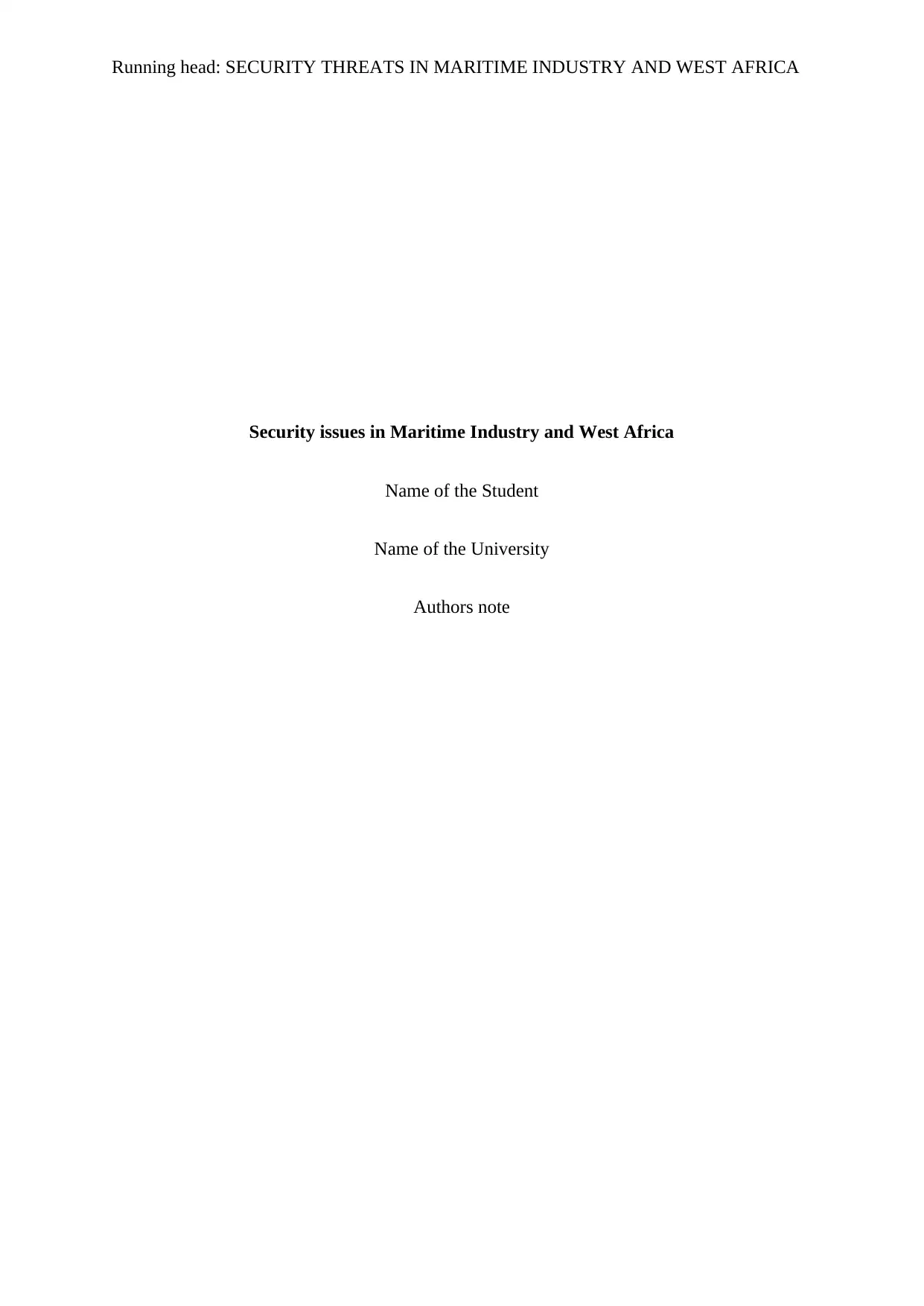
Running head: SECURITY THREATS IN MARITIME INDUSTRY AND WEST AFRICA
Security issues in Maritime Industry and West Africa
Name of the Student
Name of the University
Authors note
Security issues in Maritime Industry and West Africa
Name of the Student
Name of the University
Authors note
Secure Best Marks with AI Grader
Need help grading? Try our AI Grader for instant feedback on your assignments.
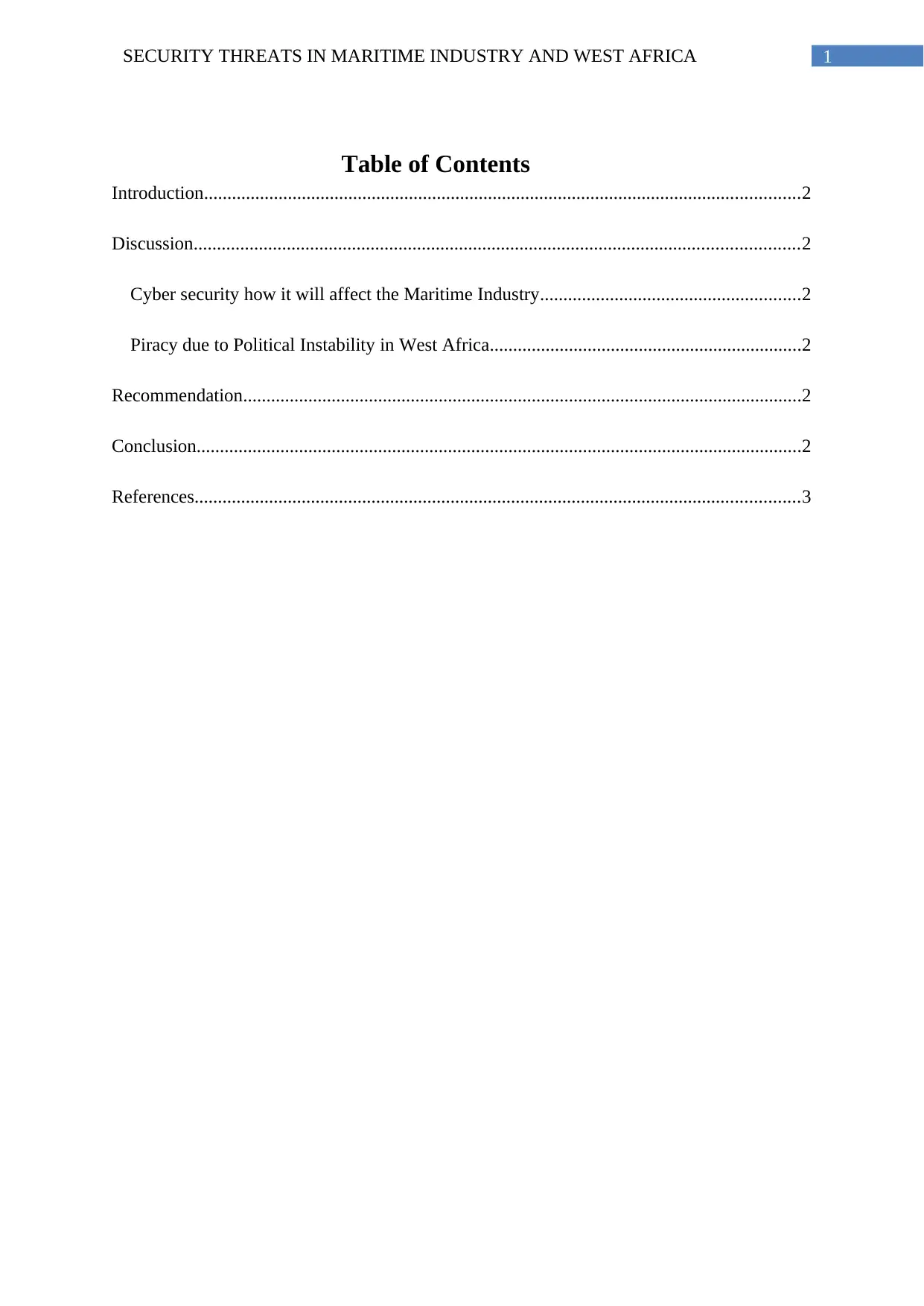
1SECURITY THREATS IN MARITIME INDUSTRY AND WEST AFRICA
Table of Contents
Introduction................................................................................................................................2
Discussion..................................................................................................................................2
Cyber security how it will affect the Maritime Industry........................................................2
Piracy due to Political Instability in West Africa...................................................................2
Recommendation........................................................................................................................2
Conclusion..................................................................................................................................2
References..................................................................................................................................3
Table of Contents
Introduction................................................................................................................................2
Discussion..................................................................................................................................2
Cyber security how it will affect the Maritime Industry........................................................2
Piracy due to Political Instability in West Africa...................................................................2
Recommendation........................................................................................................................2
Conclusion..................................................................................................................................2
References..................................................................................................................................3
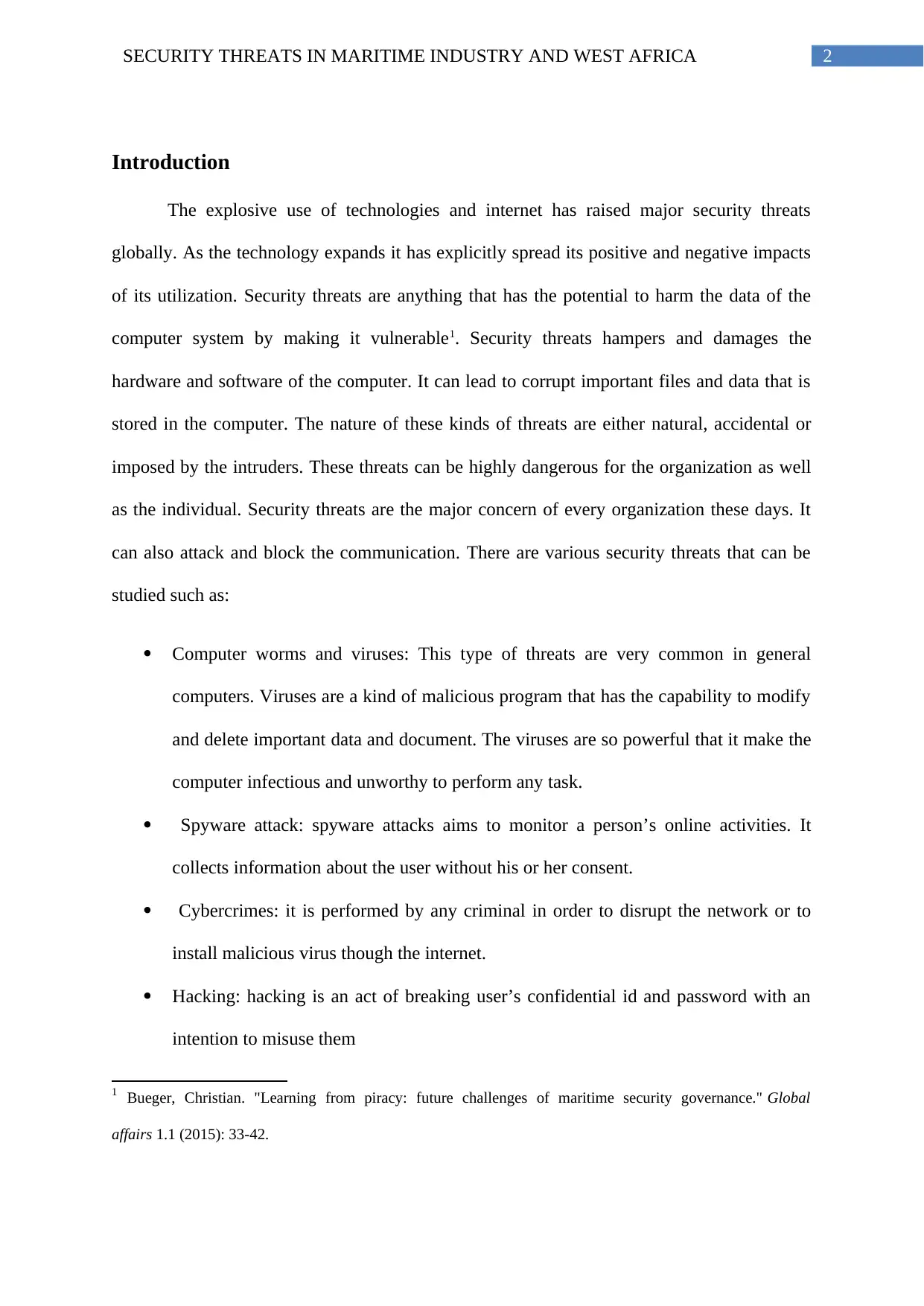
2SECURITY THREATS IN MARITIME INDUSTRY AND WEST AFRICA
Introduction
The explosive use of technologies and internet has raised major security threats
globally. As the technology expands it has explicitly spread its positive and negative impacts
of its utilization. Security threats are anything that has the potential to harm the data of the
computer system by making it vulnerable1. Security threats hampers and damages the
hardware and software of the computer. It can lead to corrupt important files and data that is
stored in the computer. The nature of these kinds of threats are either natural, accidental or
imposed by the intruders. These threats can be highly dangerous for the organization as well
as the individual. Security threats are the major concern of every organization these days. It
can also attack and block the communication. There are various security threats that can be
studied such as:
Computer worms and viruses: This type of threats are very common in general
computers. Viruses are a kind of malicious program that has the capability to modify
and delete important data and document. The viruses are so powerful that it make the
computer infectious and unworthy to perform any task.
Spyware attack: spyware attacks aims to monitor a person’s online activities. It
collects information about the user without his or her consent.
Cybercrimes: it is performed by any criminal in order to disrupt the network or to
install malicious virus though the internet.
Hacking: hacking is an act of breaking user’s confidential id and password with an
intention to misuse them
1 Bueger, Christian. "Learning from piracy: future challenges of maritime security governance." Global
affairs 1.1 (2015): 33-42.
Introduction
The explosive use of technologies and internet has raised major security threats
globally. As the technology expands it has explicitly spread its positive and negative impacts
of its utilization. Security threats are anything that has the potential to harm the data of the
computer system by making it vulnerable1. Security threats hampers and damages the
hardware and software of the computer. It can lead to corrupt important files and data that is
stored in the computer. The nature of these kinds of threats are either natural, accidental or
imposed by the intruders. These threats can be highly dangerous for the organization as well
as the individual. Security threats are the major concern of every organization these days. It
can also attack and block the communication. There are various security threats that can be
studied such as:
Computer worms and viruses: This type of threats are very common in general
computers. Viruses are a kind of malicious program that has the capability to modify
and delete important data and document. The viruses are so powerful that it make the
computer infectious and unworthy to perform any task.
Spyware attack: spyware attacks aims to monitor a person’s online activities. It
collects information about the user without his or her consent.
Cybercrimes: it is performed by any criminal in order to disrupt the network or to
install malicious virus though the internet.
Hacking: hacking is an act of breaking user’s confidential id and password with an
intention to misuse them
1 Bueger, Christian. "Learning from piracy: future challenges of maritime security governance." Global
affairs 1.1 (2015): 33-42.
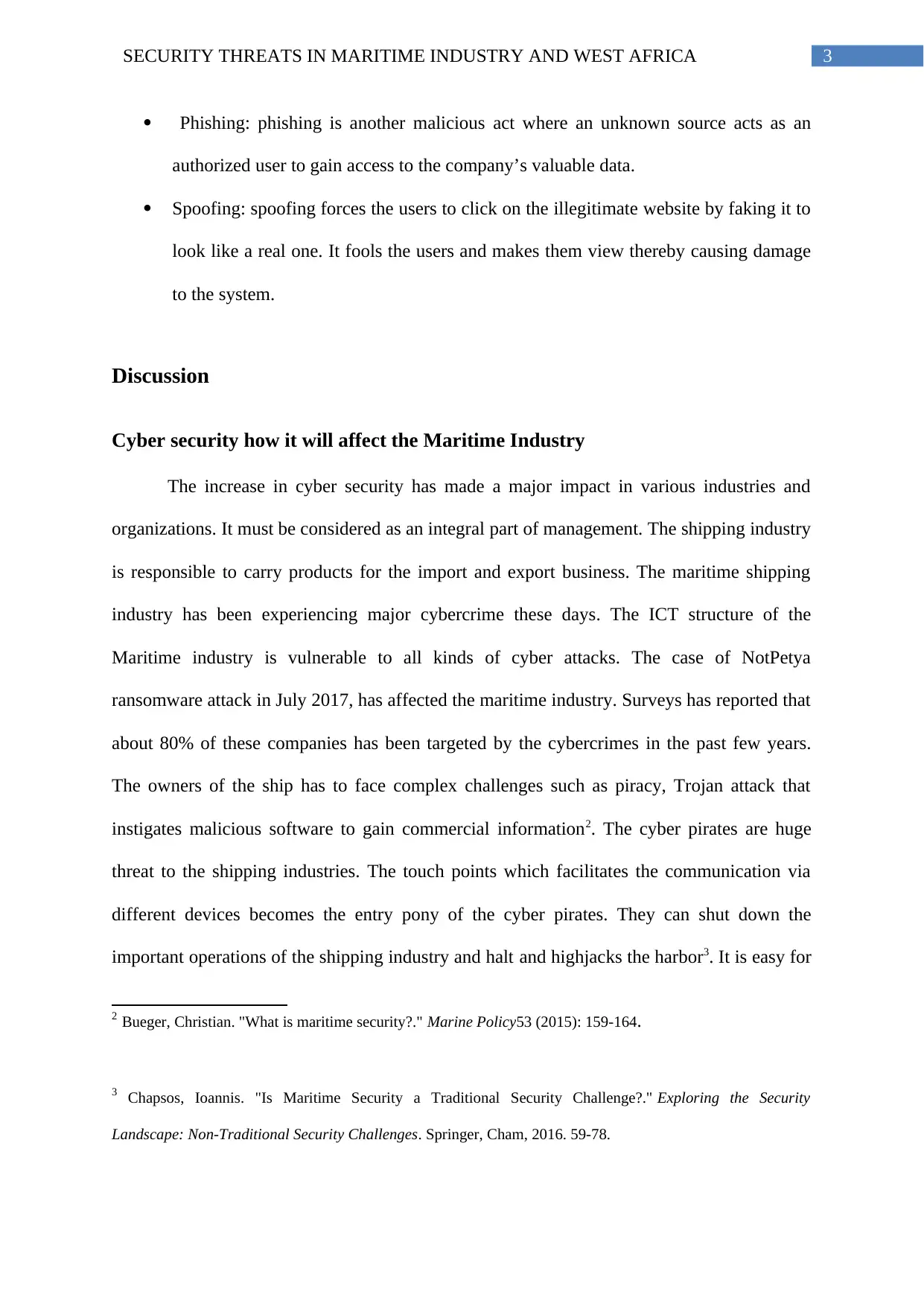
3SECURITY THREATS IN MARITIME INDUSTRY AND WEST AFRICA
Phishing: phishing is another malicious act where an unknown source acts as an
authorized user to gain access to the company’s valuable data.
Spoofing: spoofing forces the users to click on the illegitimate website by faking it to
look like a real one. It fools the users and makes them view thereby causing damage
to the system.
Discussion
Cyber security how it will affect the Maritime Industry
The increase in cyber security has made a major impact in various industries and
organizations. It must be considered as an integral part of management. The shipping industry
is responsible to carry products for the import and export business. The maritime shipping
industry has been experiencing major cybercrime these days. The ICT structure of the
Maritime industry is vulnerable to all kinds of cyber attacks. The case of NotPetya
ransomware attack in July 2017, has affected the maritime industry. Surveys has reported that
about 80% of these companies has been targeted by the cybercrimes in the past few years.
The owners of the ship has to face complex challenges such as piracy, Trojan attack that
instigates malicious software to gain commercial information2. The cyber pirates are huge
threat to the shipping industries. The touch points which facilitates the communication via
different devices becomes the entry pony of the cyber pirates. They can shut down the
important operations of the shipping industry and halt and highjacks the harbor3. It is easy for
2 Bueger, Christian. "What is maritime security?." Marine Policy53 (2015): 159-164.
3 Chapsos, Ioannis. "Is Maritime Security a Traditional Security Challenge?." Exploring the Security
Landscape: Non-Traditional Security Challenges. Springer, Cham, 2016. 59-78.
Phishing: phishing is another malicious act where an unknown source acts as an
authorized user to gain access to the company’s valuable data.
Spoofing: spoofing forces the users to click on the illegitimate website by faking it to
look like a real one. It fools the users and makes them view thereby causing damage
to the system.
Discussion
Cyber security how it will affect the Maritime Industry
The increase in cyber security has made a major impact in various industries and
organizations. It must be considered as an integral part of management. The shipping industry
is responsible to carry products for the import and export business. The maritime shipping
industry has been experiencing major cybercrime these days. The ICT structure of the
Maritime industry is vulnerable to all kinds of cyber attacks. The case of NotPetya
ransomware attack in July 2017, has affected the maritime industry. Surveys has reported that
about 80% of these companies has been targeted by the cybercrimes in the past few years.
The owners of the ship has to face complex challenges such as piracy, Trojan attack that
instigates malicious software to gain commercial information2. The cyber pirates are huge
threat to the shipping industries. The touch points which facilitates the communication via
different devices becomes the entry pony of the cyber pirates. They can shut down the
important operations of the shipping industry and halt and highjacks the harbor3. It is easy for
2 Bueger, Christian. "What is maritime security?." Marine Policy53 (2015): 159-164.
3 Chapsos, Ioannis. "Is Maritime Security a Traditional Security Challenge?." Exploring the Security
Landscape: Non-Traditional Security Challenges. Springer, Cham, 2016. 59-78.
Secure Best Marks with AI Grader
Need help grading? Try our AI Grader for instant feedback on your assignments.
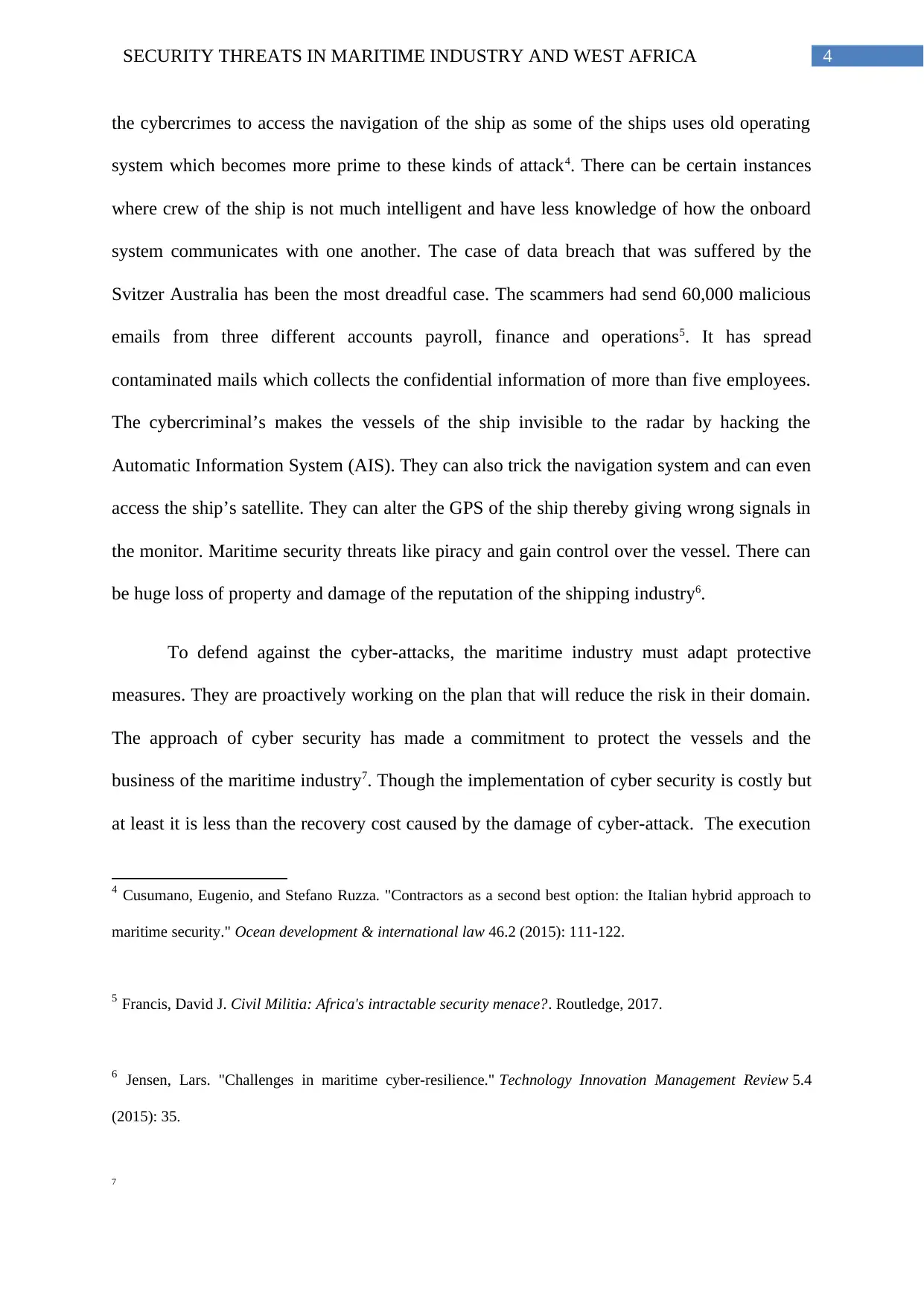
4SECURITY THREATS IN MARITIME INDUSTRY AND WEST AFRICA
the cybercrimes to access the navigation of the ship as some of the ships uses old operating
system which becomes more prime to these kinds of attack4. There can be certain instances
where crew of the ship is not much intelligent and have less knowledge of how the onboard
system communicates with one another. The case of data breach that was suffered by the
Svitzer Australia has been the most dreadful case. The scammers had send 60,000 malicious
emails from three different accounts payroll, finance and operations5. It has spread
contaminated mails which collects the confidential information of more than five employees.
The cybercriminal’s makes the vessels of the ship invisible to the radar by hacking the
Automatic Information System (AIS). They can also trick the navigation system and can even
access the ship’s satellite. They can alter the GPS of the ship thereby giving wrong signals in
the monitor. Maritime security threats like piracy and gain control over the vessel. There can
be huge loss of property and damage of the reputation of the shipping industry6.
To defend against the cyber-attacks, the maritime industry must adapt protective
measures. They are proactively working on the plan that will reduce the risk in their domain.
The approach of cyber security has made a commitment to protect the vessels and the
business of the maritime industry7. Though the implementation of cyber security is costly but
at least it is less than the recovery cost caused by the damage of cyber-attack. The execution
4 Cusumano, Eugenio, and Stefano Ruzza. "Contractors as a second best option: the Italian hybrid approach to
maritime security." Ocean development & international law 46.2 (2015): 111-122.
5 Francis, David J. Civil Militia: Africa's intractable security menace?. Routledge, 2017.
6 Jensen, Lars. "Challenges in maritime cyber-resilience." Technology Innovation Management Review 5.4
(2015): 35.
7
the cybercrimes to access the navigation of the ship as some of the ships uses old operating
system which becomes more prime to these kinds of attack4. There can be certain instances
where crew of the ship is not much intelligent and have less knowledge of how the onboard
system communicates with one another. The case of data breach that was suffered by the
Svitzer Australia has been the most dreadful case. The scammers had send 60,000 malicious
emails from three different accounts payroll, finance and operations5. It has spread
contaminated mails which collects the confidential information of more than five employees.
The cybercriminal’s makes the vessels of the ship invisible to the radar by hacking the
Automatic Information System (AIS). They can also trick the navigation system and can even
access the ship’s satellite. They can alter the GPS of the ship thereby giving wrong signals in
the monitor. Maritime security threats like piracy and gain control over the vessel. There can
be huge loss of property and damage of the reputation of the shipping industry6.
To defend against the cyber-attacks, the maritime industry must adapt protective
measures. They are proactively working on the plan that will reduce the risk in their domain.
The approach of cyber security has made a commitment to protect the vessels and the
business of the maritime industry7. Though the implementation of cyber security is costly but
at least it is less than the recovery cost caused by the damage of cyber-attack. The execution
4 Cusumano, Eugenio, and Stefano Ruzza. "Contractors as a second best option: the Italian hybrid approach to
maritime security." Ocean development & international law 46.2 (2015): 111-122.
5 Francis, David J. Civil Militia: Africa's intractable security menace?. Routledge, 2017.
6 Jensen, Lars. "Challenges in maritime cyber-resilience." Technology Innovation Management Review 5.4
(2015): 35.
7
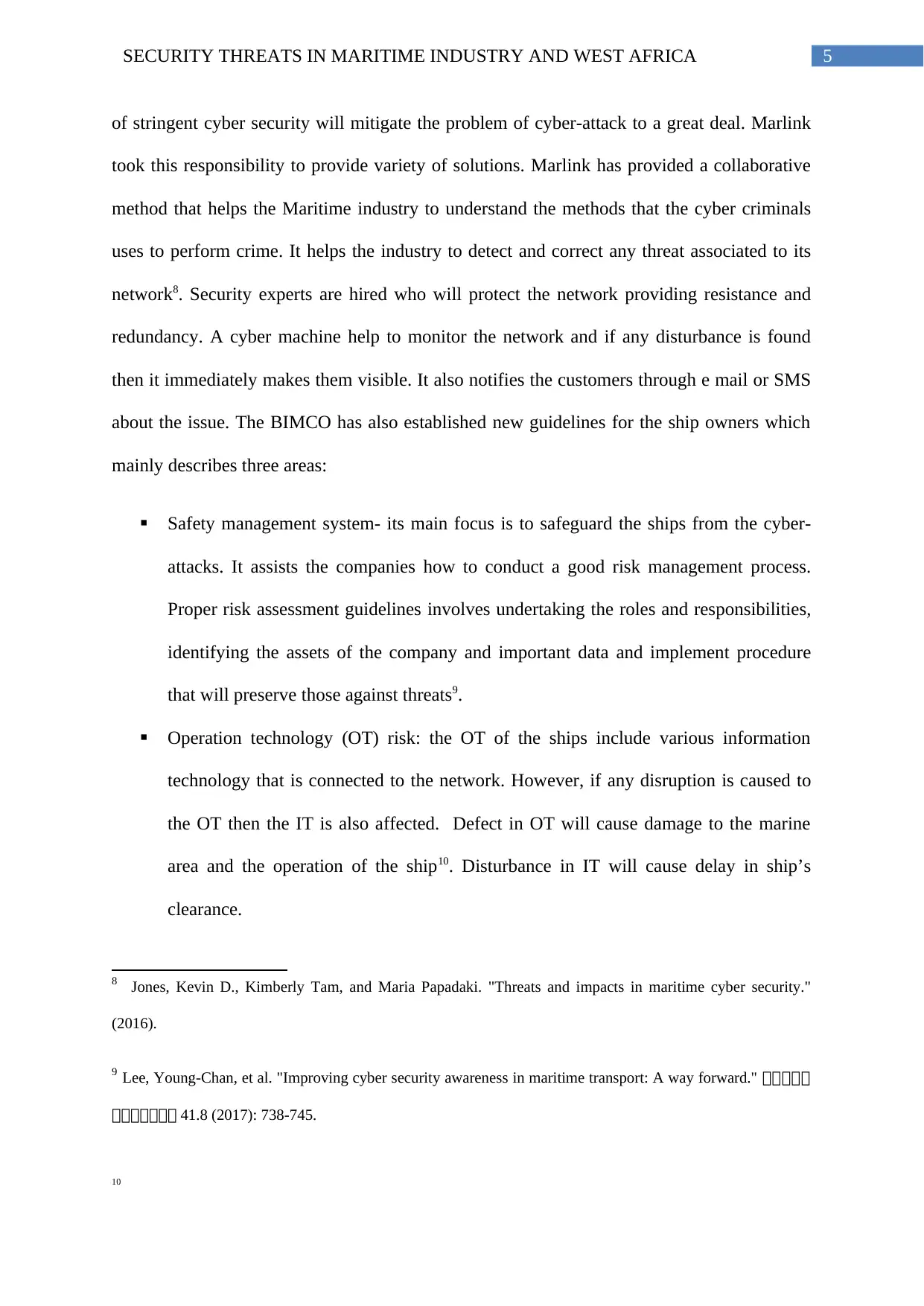
5SECURITY THREATS IN MARITIME INDUSTRY AND WEST AFRICA
of stringent cyber security will mitigate the problem of cyber-attack to a great deal. Marlink
took this responsibility to provide variety of solutions. Marlink has provided a collaborative
method that helps the Maritime industry to understand the methods that the cyber criminals
uses to perform crime. It helps the industry to detect and correct any threat associated to its
network8. Security experts are hired who will protect the network providing resistance and
redundancy. A cyber machine help to monitor the network and if any disturbance is found
then it immediately makes them visible. It also notifies the customers through e mail or SMS
about the issue. The BIMCO has also established new guidelines for the ship owners which
mainly describes three areas:
Safety management system- its main focus is to safeguard the ships from the cyber-
attacks. It assists the companies how to conduct a good risk management process.
Proper risk assessment guidelines involves undertaking the roles and responsibilities,
identifying the assets of the company and important data and implement procedure
that will preserve those against threats9.
Operation technology (OT) risk: the OT of the ships include various information
technology that is connected to the network. However, if any disruption is caused to
the OT then the IT is also affected. Defect in OT will cause damage to the marine
area and the operation of the ship10. Disturbance in IT will cause delay in ship’s
clearance.
8 Jones, Kevin D., Kimberly Tam, and Maria Papadaki. "Threats and impacts in maritime cyber security."
(2016).
9 Lee, Young-Chan, et al. "Improving cyber security awareness in maritime transport: A way forward." 한한한한한
한한한한한한한 41.8 (2017): 738-745.
10
of stringent cyber security will mitigate the problem of cyber-attack to a great deal. Marlink
took this responsibility to provide variety of solutions. Marlink has provided a collaborative
method that helps the Maritime industry to understand the methods that the cyber criminals
uses to perform crime. It helps the industry to detect and correct any threat associated to its
network8. Security experts are hired who will protect the network providing resistance and
redundancy. A cyber machine help to monitor the network and if any disturbance is found
then it immediately makes them visible. It also notifies the customers through e mail or SMS
about the issue. The BIMCO has also established new guidelines for the ship owners which
mainly describes three areas:
Safety management system- its main focus is to safeguard the ships from the cyber-
attacks. It assists the companies how to conduct a good risk management process.
Proper risk assessment guidelines involves undertaking the roles and responsibilities,
identifying the assets of the company and important data and implement procedure
that will preserve those against threats9.
Operation technology (OT) risk: the OT of the ships include various information
technology that is connected to the network. However, if any disruption is caused to
the OT then the IT is also affected. Defect in OT will cause damage to the marine
area and the operation of the ship10. Disturbance in IT will cause delay in ship’s
clearance.
8 Jones, Kevin D., Kimberly Tam, and Maria Papadaki. "Threats and impacts in maritime cyber security."
(2016).
9 Lee, Young-Chan, et al. "Improving cyber security awareness in maritime transport: A way forward." 한한한한한
한한한한한한한 41.8 (2017): 738-745.
10
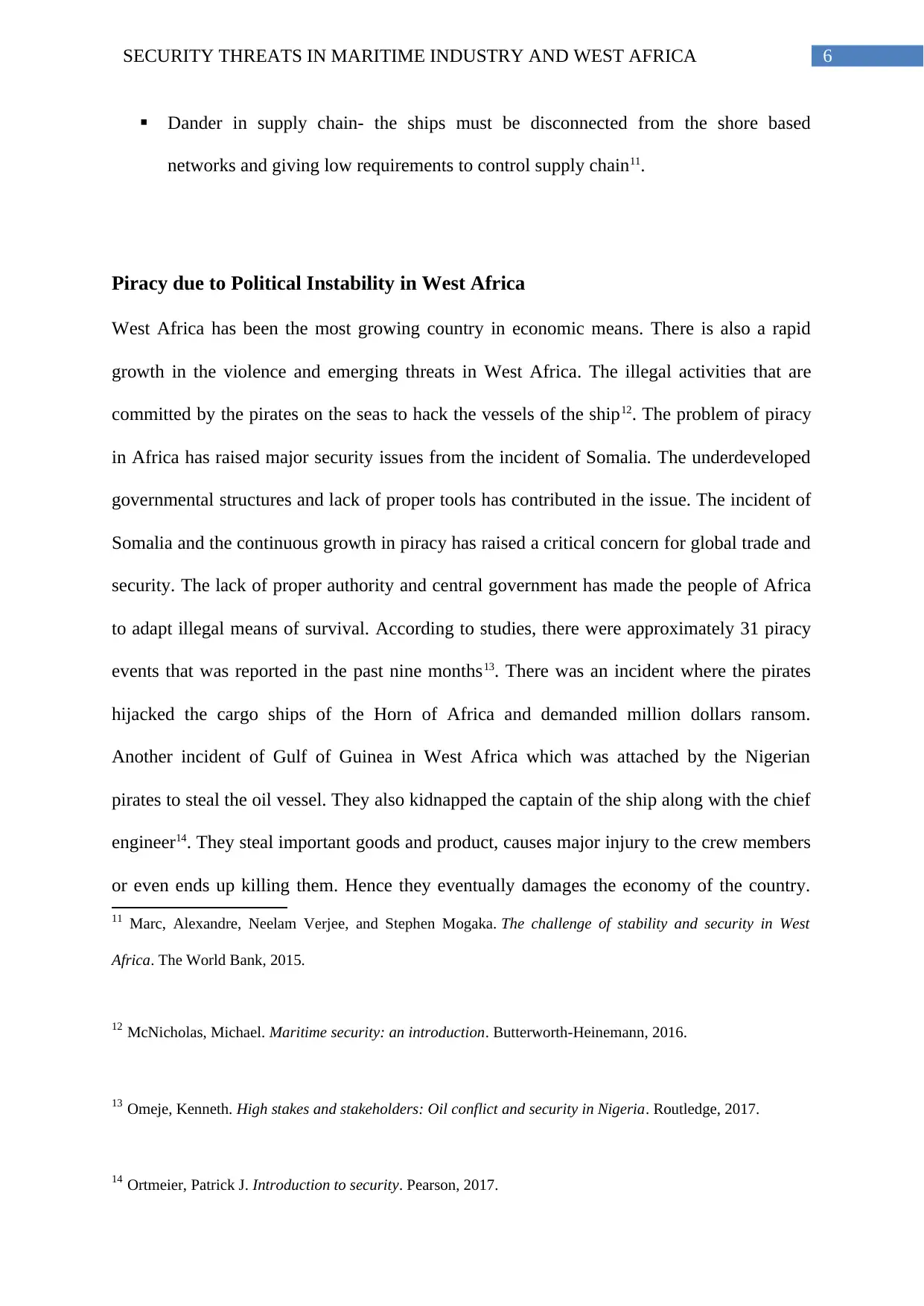
6SECURITY THREATS IN MARITIME INDUSTRY AND WEST AFRICA
Dander in supply chain- the ships must be disconnected from the shore based
networks and giving low requirements to control supply chain11.
Piracy due to Political Instability in West Africa
West Africa has been the most growing country in economic means. There is also a rapid
growth in the violence and emerging threats in West Africa. The illegal activities that are
committed by the pirates on the seas to hack the vessels of the ship12. The problem of piracy
in Africa has raised major security issues from the incident of Somalia. The underdeveloped
governmental structures and lack of proper tools has contributed in the issue. The incident of
Somalia and the continuous growth in piracy has raised a critical concern for global trade and
security. The lack of proper authority and central government has made the people of Africa
to adapt illegal means of survival. According to studies, there were approximately 31 piracy
events that was reported in the past nine months13. There was an incident where the pirates
hijacked the cargo ships of the Horn of Africa and demanded million dollars ransom.
Another incident of Gulf of Guinea in West Africa which was attached by the Nigerian
pirates to steal the oil vessel. They also kidnapped the captain of the ship along with the chief
engineer14. They steal important goods and product, causes major injury to the crew members
or even ends up killing them. Hence they eventually damages the economy of the country.
11 Marc, Alexandre, Neelam Verjee, and Stephen Mogaka. The challenge of stability and security in West
Africa. The World Bank, 2015.
12 McNicholas, Michael. Maritime security: an introduction. Butterworth-Heinemann, 2016.
13 Omeje, Kenneth. High stakes and stakeholders: Oil conflict and security in Nigeria. Routledge, 2017.
14 Ortmeier, Patrick J. Introduction to security. Pearson, 2017.
Dander in supply chain- the ships must be disconnected from the shore based
networks and giving low requirements to control supply chain11.
Piracy due to Political Instability in West Africa
West Africa has been the most growing country in economic means. There is also a rapid
growth in the violence and emerging threats in West Africa. The illegal activities that are
committed by the pirates on the seas to hack the vessels of the ship12. The problem of piracy
in Africa has raised major security issues from the incident of Somalia. The underdeveloped
governmental structures and lack of proper tools has contributed in the issue. The incident of
Somalia and the continuous growth in piracy has raised a critical concern for global trade and
security. The lack of proper authority and central government has made the people of Africa
to adapt illegal means of survival. According to studies, there were approximately 31 piracy
events that was reported in the past nine months13. There was an incident where the pirates
hijacked the cargo ships of the Horn of Africa and demanded million dollars ransom.
Another incident of Gulf of Guinea in West Africa which was attached by the Nigerian
pirates to steal the oil vessel. They also kidnapped the captain of the ship along with the chief
engineer14. They steal important goods and product, causes major injury to the crew members
or even ends up killing them. Hence they eventually damages the economy of the country.
11 Marc, Alexandre, Neelam Verjee, and Stephen Mogaka. The challenge of stability and security in West
Africa. The World Bank, 2015.
12 McNicholas, Michael. Maritime security: an introduction. Butterworth-Heinemann, 2016.
13 Omeje, Kenneth. High stakes and stakeholders: Oil conflict and security in Nigeria. Routledge, 2017.
14 Ortmeier, Patrick J. Introduction to security. Pearson, 2017.
Paraphrase This Document
Need a fresh take? Get an instant paraphrase of this document with our AI Paraphraser
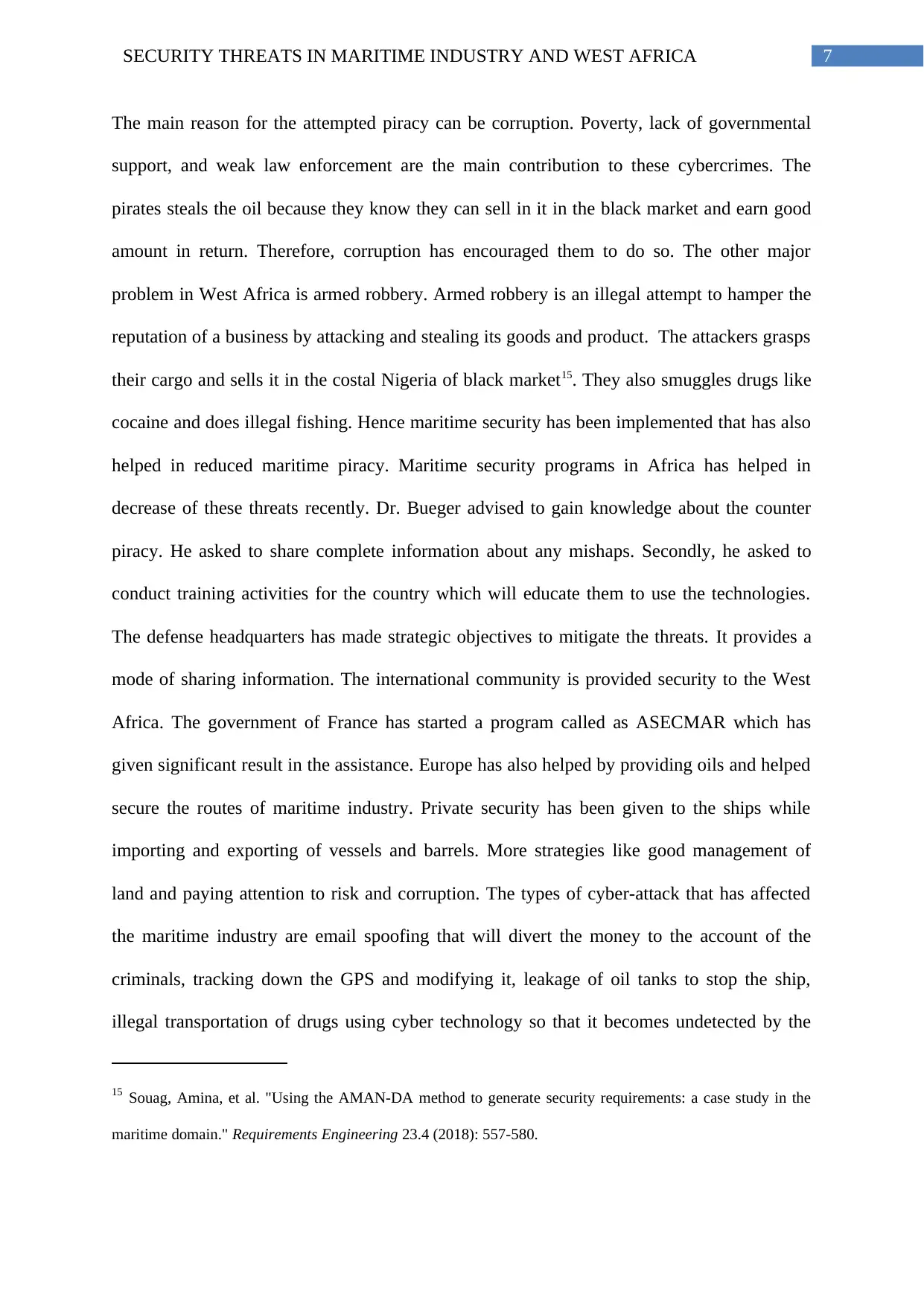
7SECURITY THREATS IN MARITIME INDUSTRY AND WEST AFRICA
The main reason for the attempted piracy can be corruption. Poverty, lack of governmental
support, and weak law enforcement are the main contribution to these cybercrimes. The
pirates steals the oil because they know they can sell in it in the black market and earn good
amount in return. Therefore, corruption has encouraged them to do so. The other major
problem in West Africa is armed robbery. Armed robbery is an illegal attempt to hamper the
reputation of a business by attacking and stealing its goods and product. The attackers grasps
their cargo and sells it in the costal Nigeria of black market15. They also smuggles drugs like
cocaine and does illegal fishing. Hence maritime security has been implemented that has also
helped in reduced maritime piracy. Maritime security programs in Africa has helped in
decrease of these threats recently. Dr. Bueger advised to gain knowledge about the counter
piracy. He asked to share complete information about any mishaps. Secondly, he asked to
conduct training activities for the country which will educate them to use the technologies.
The defense headquarters has made strategic objectives to mitigate the threats. It provides a
mode of sharing information. The international community is provided security to the West
Africa. The government of France has started a program called as ASECMAR which has
given significant result in the assistance. Europe has also helped by providing oils and helped
secure the routes of maritime industry. Private security has been given to the ships while
importing and exporting of vessels and barrels. More strategies like good management of
land and paying attention to risk and corruption. The types of cyber-attack that has affected
the maritime industry are email spoofing that will divert the money to the account of the
criminals, tracking down the GPS and modifying it, leakage of oil tanks to stop the ship,
illegal transportation of drugs using cyber technology so that it becomes undetected by the
15 Souag, Amina, et al. "Using the AMAN-DA method to generate security requirements: a case study in the
maritime domain." Requirements Engineering 23.4 (2018): 557-580.
The main reason for the attempted piracy can be corruption. Poverty, lack of governmental
support, and weak law enforcement are the main contribution to these cybercrimes. The
pirates steals the oil because they know they can sell in it in the black market and earn good
amount in return. Therefore, corruption has encouraged them to do so. The other major
problem in West Africa is armed robbery. Armed robbery is an illegal attempt to hamper the
reputation of a business by attacking and stealing its goods and product. The attackers grasps
their cargo and sells it in the costal Nigeria of black market15. They also smuggles drugs like
cocaine and does illegal fishing. Hence maritime security has been implemented that has also
helped in reduced maritime piracy. Maritime security programs in Africa has helped in
decrease of these threats recently. Dr. Bueger advised to gain knowledge about the counter
piracy. He asked to share complete information about any mishaps. Secondly, he asked to
conduct training activities for the country which will educate them to use the technologies.
The defense headquarters has made strategic objectives to mitigate the threats. It provides a
mode of sharing information. The international community is provided security to the West
Africa. The government of France has started a program called as ASECMAR which has
given significant result in the assistance. Europe has also helped by providing oils and helped
secure the routes of maritime industry. Private security has been given to the ships while
importing and exporting of vessels and barrels. More strategies like good management of
land and paying attention to risk and corruption. The types of cyber-attack that has affected
the maritime industry are email spoofing that will divert the money to the account of the
criminals, tracking down the GPS and modifying it, leakage of oil tanks to stop the ship,
illegal transportation of drugs using cyber technology so that it becomes undetected by the
15 Souag, Amina, et al. "Using the AMAN-DA method to generate security requirements: a case study in the
maritime domain." Requirements Engineering 23.4 (2018): 557-580.
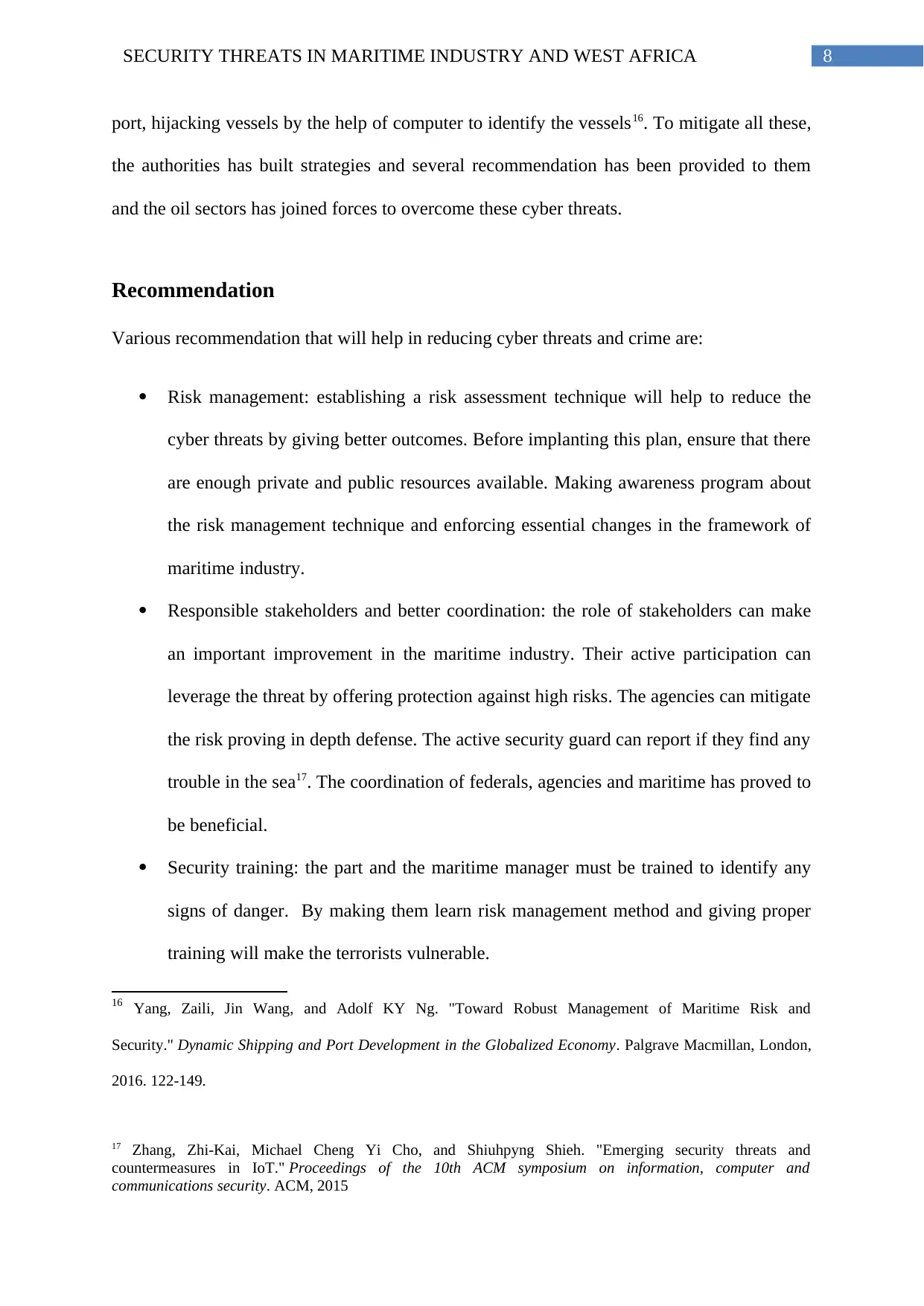
8SECURITY THREATS IN MARITIME INDUSTRY AND WEST AFRICA
port, hijacking vessels by the help of computer to identify the vessels16. To mitigate all these,
the authorities has built strategies and several recommendation has been provided to them
and the oil sectors has joined forces to overcome these cyber threats.
Recommendation
Various recommendation that will help in reducing cyber threats and crime are:
Risk management: establishing a risk assessment technique will help to reduce the
cyber threats by giving better outcomes. Before implanting this plan, ensure that there
are enough private and public resources available. Making awareness program about
the risk management technique and enforcing essential changes in the framework of
maritime industry.
Responsible stakeholders and better coordination: the role of stakeholders can make
an important improvement in the maritime industry. Their active participation can
leverage the threat by offering protection against high risks. The agencies can mitigate
the risk proving in depth defense. The active security guard can report if they find any
trouble in the sea17. The coordination of federals, agencies and maritime has proved to
be beneficial.
Security training: the part and the maritime manager must be trained to identify any
signs of danger. By making them learn risk management method and giving proper
training will make the terrorists vulnerable.
16 Yang, Zaili, Jin Wang, and Adolf KY Ng. "Toward Robust Management of Maritime Risk and
Security." Dynamic Shipping and Port Development in the Globalized Economy. Palgrave Macmillan, London,
2016. 122-149.
17 Zhang, Zhi-Kai, Michael Cheng Yi Cho, and Shiuhpyng Shieh. "Emerging security threats and
countermeasures in IoT." Proceedings of the 10th ACM symposium on information, computer and
communications security. ACM, 2015
port, hijacking vessels by the help of computer to identify the vessels16. To mitigate all these,
the authorities has built strategies and several recommendation has been provided to them
and the oil sectors has joined forces to overcome these cyber threats.
Recommendation
Various recommendation that will help in reducing cyber threats and crime are:
Risk management: establishing a risk assessment technique will help to reduce the
cyber threats by giving better outcomes. Before implanting this plan, ensure that there
are enough private and public resources available. Making awareness program about
the risk management technique and enforcing essential changes in the framework of
maritime industry.
Responsible stakeholders and better coordination: the role of stakeholders can make
an important improvement in the maritime industry. Their active participation can
leverage the threat by offering protection against high risks. The agencies can mitigate
the risk proving in depth defense. The active security guard can report if they find any
trouble in the sea17. The coordination of federals, agencies and maritime has proved to
be beneficial.
Security training: the part and the maritime manager must be trained to identify any
signs of danger. By making them learn risk management method and giving proper
training will make the terrorists vulnerable.
16 Yang, Zaili, Jin Wang, and Adolf KY Ng. "Toward Robust Management of Maritime Risk and
Security." Dynamic Shipping and Port Development in the Globalized Economy. Palgrave Macmillan, London,
2016. 122-149.
17 Zhang, Zhi-Kai, Michael Cheng Yi Cho, and Shiuhpyng Shieh. "Emerging security threats and
countermeasures in IoT." Proceedings of the 10th ACM symposium on information, computer and
communications security. ACM, 2015
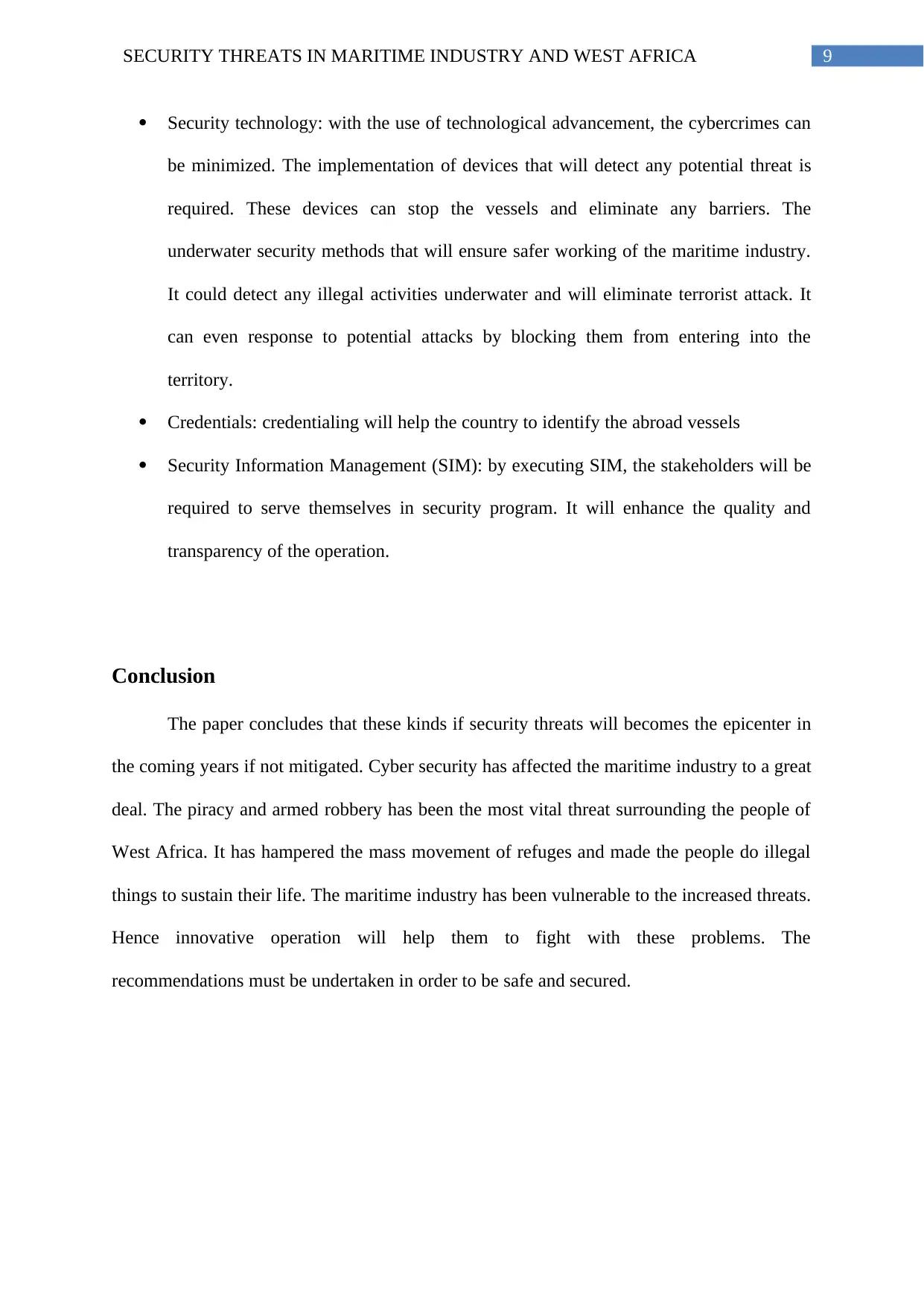
9SECURITY THREATS IN MARITIME INDUSTRY AND WEST AFRICA
Security technology: with the use of technological advancement, the cybercrimes can
be minimized. The implementation of devices that will detect any potential threat is
required. These devices can stop the vessels and eliminate any barriers. The
underwater security methods that will ensure safer working of the maritime industry.
It could detect any illegal activities underwater and will eliminate terrorist attack. It
can even response to potential attacks by blocking them from entering into the
territory.
Credentials: credentialing will help the country to identify the abroad vessels
Security Information Management (SIM): by executing SIM, the stakeholders will be
required to serve themselves in security program. It will enhance the quality and
transparency of the operation.
Conclusion
The paper concludes that these kinds if security threats will becomes the epicenter in
the coming years if not mitigated. Cyber security has affected the maritime industry to a great
deal. The piracy and armed robbery has been the most vital threat surrounding the people of
West Africa. It has hampered the mass movement of refuges and made the people do illegal
things to sustain their life. The maritime industry has been vulnerable to the increased threats.
Hence innovative operation will help them to fight with these problems. The
recommendations must be undertaken in order to be safe and secured.
Security technology: with the use of technological advancement, the cybercrimes can
be minimized. The implementation of devices that will detect any potential threat is
required. These devices can stop the vessels and eliminate any barriers. The
underwater security methods that will ensure safer working of the maritime industry.
It could detect any illegal activities underwater and will eliminate terrorist attack. It
can even response to potential attacks by blocking them from entering into the
territory.
Credentials: credentialing will help the country to identify the abroad vessels
Security Information Management (SIM): by executing SIM, the stakeholders will be
required to serve themselves in security program. It will enhance the quality and
transparency of the operation.
Conclusion
The paper concludes that these kinds if security threats will becomes the epicenter in
the coming years if not mitigated. Cyber security has affected the maritime industry to a great
deal. The piracy and armed robbery has been the most vital threat surrounding the people of
West Africa. It has hampered the mass movement of refuges and made the people do illegal
things to sustain their life. The maritime industry has been vulnerable to the increased threats.
Hence innovative operation will help them to fight with these problems. The
recommendations must be undertaken in order to be safe and secured.
Secure Best Marks with AI Grader
Need help grading? Try our AI Grader for instant feedback on your assignments.
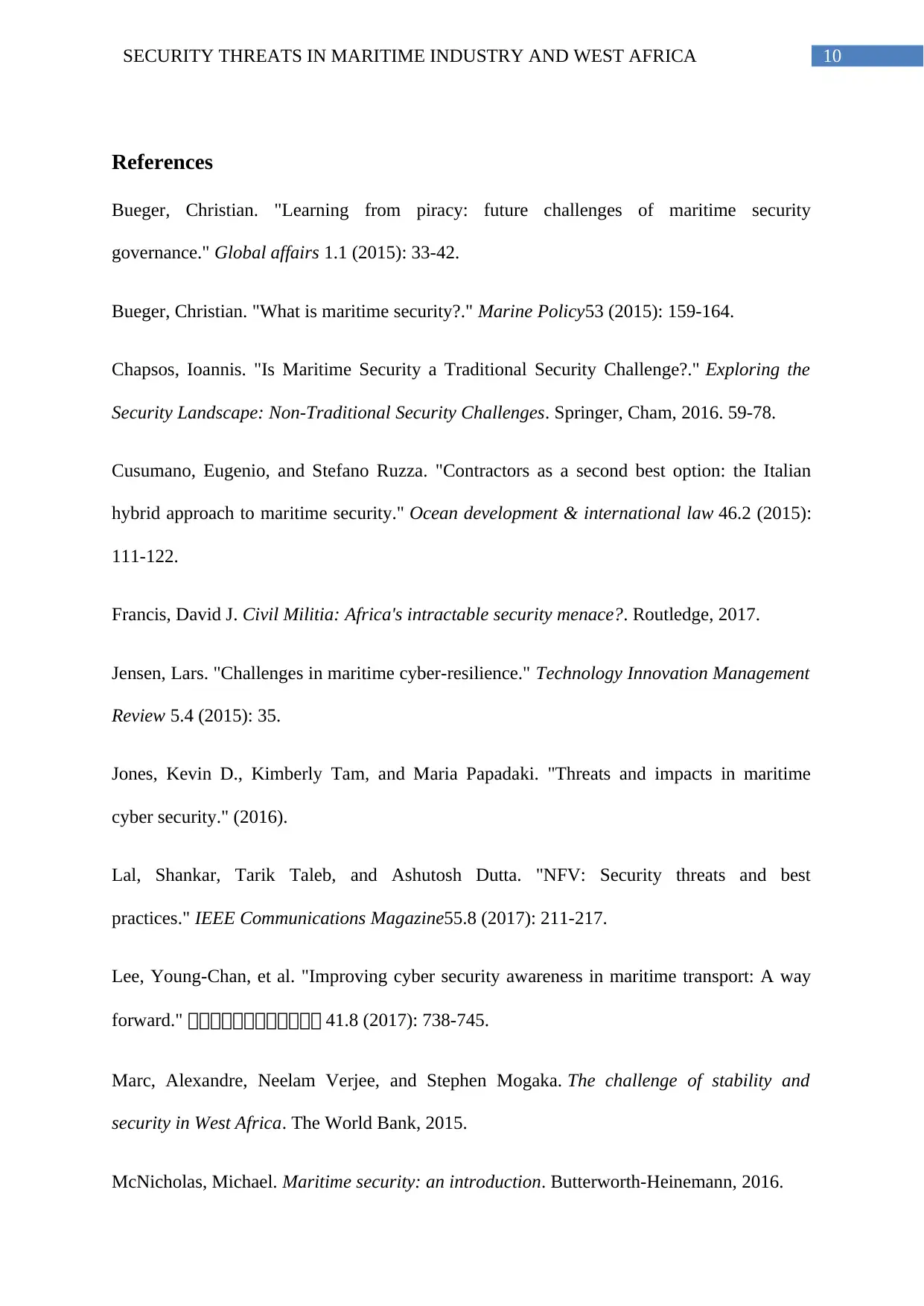
10SECURITY THREATS IN MARITIME INDUSTRY AND WEST AFRICA
References
Bueger, Christian. "Learning from piracy: future challenges of maritime security
governance." Global affairs 1.1 (2015): 33-42.
Bueger, Christian. "What is maritime security?." Marine Policy53 (2015): 159-164.
Chapsos, Ioannis. "Is Maritime Security a Traditional Security Challenge?." Exploring the
Security Landscape: Non-Traditional Security Challenges. Springer, Cham, 2016. 59-78.
Cusumano, Eugenio, and Stefano Ruzza. "Contractors as a second best option: the Italian
hybrid approach to maritime security." Ocean development & international law 46.2 (2015):
111-122.
Francis, David J. Civil Militia: Africa's intractable security menace?. Routledge, 2017.
Jensen, Lars. "Challenges in maritime cyber-resilience." Technology Innovation Management
Review 5.4 (2015): 35.
Jones, Kevin D., Kimberly Tam, and Maria Papadaki. "Threats and impacts in maritime
cyber security." (2016).
Lal, Shankar, Tarik Taleb, and Ashutosh Dutta. "NFV: Security threats and best
practices." IEEE Communications Magazine55.8 (2017): 211-217.
Lee, Young-Chan, et al. "Improving cyber security awareness in maritime transport: A way
forward." 한한한한한한한한한한한한 41.8 (2017): 738-745.
Marc, Alexandre, Neelam Verjee, and Stephen Mogaka. The challenge of stability and
security in West Africa. The World Bank, 2015.
McNicholas, Michael. Maritime security: an introduction. Butterworth-Heinemann, 2016.
References
Bueger, Christian. "Learning from piracy: future challenges of maritime security
governance." Global affairs 1.1 (2015): 33-42.
Bueger, Christian. "What is maritime security?." Marine Policy53 (2015): 159-164.
Chapsos, Ioannis. "Is Maritime Security a Traditional Security Challenge?." Exploring the
Security Landscape: Non-Traditional Security Challenges. Springer, Cham, 2016. 59-78.
Cusumano, Eugenio, and Stefano Ruzza. "Contractors as a second best option: the Italian
hybrid approach to maritime security." Ocean development & international law 46.2 (2015):
111-122.
Francis, David J. Civil Militia: Africa's intractable security menace?. Routledge, 2017.
Jensen, Lars. "Challenges in maritime cyber-resilience." Technology Innovation Management
Review 5.4 (2015): 35.
Jones, Kevin D., Kimberly Tam, and Maria Papadaki. "Threats and impacts in maritime
cyber security." (2016).
Lal, Shankar, Tarik Taleb, and Ashutosh Dutta. "NFV: Security threats and best
practices." IEEE Communications Magazine55.8 (2017): 211-217.
Lee, Young-Chan, et al. "Improving cyber security awareness in maritime transport: A way
forward." 한한한한한한한한한한한한 41.8 (2017): 738-745.
Marc, Alexandre, Neelam Verjee, and Stephen Mogaka. The challenge of stability and
security in West Africa. The World Bank, 2015.
McNicholas, Michael. Maritime security: an introduction. Butterworth-Heinemann, 2016.
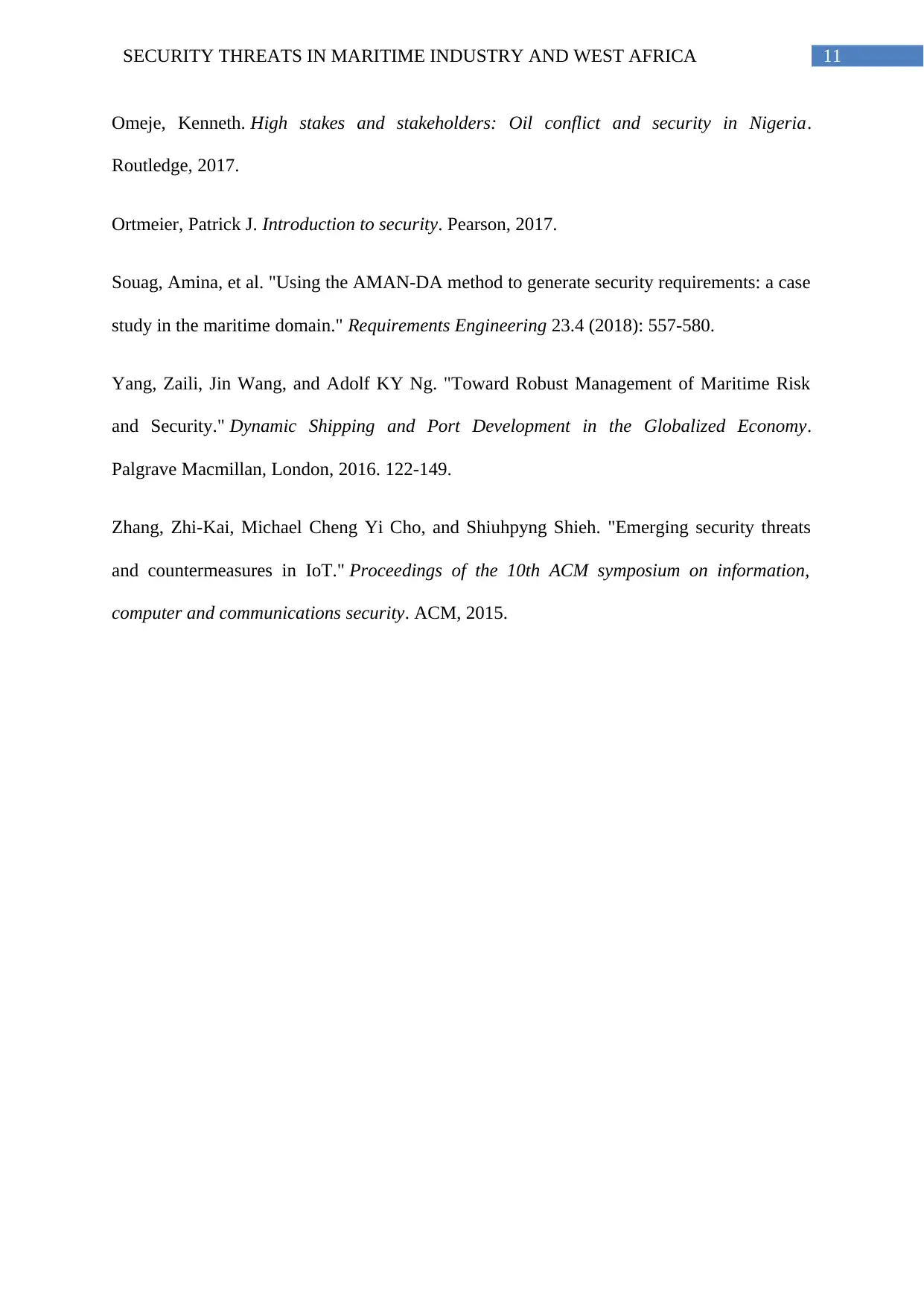
11SECURITY THREATS IN MARITIME INDUSTRY AND WEST AFRICA
Omeje, Kenneth. High stakes and stakeholders: Oil conflict and security in Nigeria.
Routledge, 2017.
Ortmeier, Patrick J. Introduction to security. Pearson, 2017.
Souag, Amina, et al. "Using the AMAN-DA method to generate security requirements: a case
study in the maritime domain." Requirements Engineering 23.4 (2018): 557-580.
Yang, Zaili, Jin Wang, and Adolf KY Ng. "Toward Robust Management of Maritime Risk
and Security." Dynamic Shipping and Port Development in the Globalized Economy.
Palgrave Macmillan, London, 2016. 122-149.
Zhang, Zhi-Kai, Michael Cheng Yi Cho, and Shiuhpyng Shieh. "Emerging security threats
and countermeasures in IoT." Proceedings of the 10th ACM symposium on information,
computer and communications security. ACM, 2015.
Omeje, Kenneth. High stakes and stakeholders: Oil conflict and security in Nigeria.
Routledge, 2017.
Ortmeier, Patrick J. Introduction to security. Pearson, 2017.
Souag, Amina, et al. "Using the AMAN-DA method to generate security requirements: a case
study in the maritime domain." Requirements Engineering 23.4 (2018): 557-580.
Yang, Zaili, Jin Wang, and Adolf KY Ng. "Toward Robust Management of Maritime Risk
and Security." Dynamic Shipping and Port Development in the Globalized Economy.
Palgrave Macmillan, London, 2016. 122-149.
Zhang, Zhi-Kai, Michael Cheng Yi Cho, and Shiuhpyng Shieh. "Emerging security threats
and countermeasures in IoT." Proceedings of the 10th ACM symposium on information,
computer and communications security. ACM, 2015.
1 out of 12
Related Documents
Your All-in-One AI-Powered Toolkit for Academic Success.
+13062052269
info@desklib.com
Available 24*7 on WhatsApp / Email
![[object Object]](/_next/static/media/star-bottom.7253800d.svg)
Unlock your academic potential
© 2024 | Zucol Services PVT LTD | All rights reserved.





